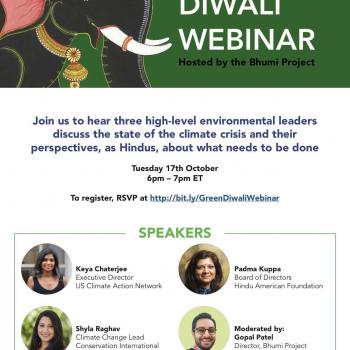Hindus commonly refer to Hinduism as Sanatana Dharma, or the Eternal Truth, and believe in the concept of reincarnation. Hence, the concept of global destruction with an end to the physical and cosmic world, is a foreign one. The cycle of rebirth does not indicate an end, but a continuum of life and death. As explained by the monks at HinduismToday.com, “The purpose of rebirth is to progressively achieve spiritual maturity and God Realization. Eventually each soul learns to live by religious principles and avoid creating negative karma. The process of reincarnation continues through many lives until the soul achieves liberation [moksha].”
In fact, the Mimamsakas – followers of one of the six schools of thought within Hinduism held that the world remains essentially the same all through the years. The doctrine that na hi kada-chid anidrasam jagat, “the world was never any different from what it is now,” implies that the affairs of the world do not alter with the passage of time and that human nature remains constant. History repeats itself. Wars have always been fought, and violence, deceit, ambition, envy, hatred, fear, suspicion, anger, pride, revenge, passion and prejudice have impacted man throughout the ages. Periods of agitation and turmoil are always followed by spells of calm and comfort – but there are always individuals who are divinely inspired and operate as if they are emissaries of God.
Carl Sagan reinforces the Hindu understanding that there is no apocalyptic end, in Cosmos: “The Hindu religion is the only one of the world’s great faiths dedicated to the idea that the Cosmos itself undergoes an immense, indeed an infinite, number of deaths and rebirths.” There is no end in or to the cosmos: destruction and creation are a continuous process. The stories of the avatars of Vishnu, the Protector, are also a testament to – and an easier way to comprehend – this cyclical process: Whenever evil prevails and those who are good suffer, there is a manifestation of the Divine to put an end to the evil and support the cause of the good. Each yuga, or age, Vishnu takes a different form, starting with the form of a fish – where there is an associated flood story. The most commonly known avatars of Vishnu, Rama and Krishna are the heroes of the most popular stories, told to children and loved by kids and adults alike. The closest thing to the end of the world is actually the end of a yuga – followed by the beginning of a new yuga. Known as pralaya, this destruction of the physical, illusory world with all its evil, is as close to the concept of apocalypse as possible. Pralaya doesn’t really consider the continuity of creation: God himself is there at the time of each pralaya, with the seeds of creation.
So while the dictionary definition of the word apocalypse refers to “the complete final destruction of the world, especially as described in the biblical book of Revelation,” a Hindu can more closely understand the word from its etymology: apocalypse is from the Greek “apo” (un) and “kaluptein” (cover) – and thus “apokaluptein” means to uncover or reveal.
In chapter 6 of the Bhagavad Gita, the path to dhyana yoga – the yoga of meditation – is outlined, and the ideal of Self Realization – to uncover or reveal one’s True Self, the spark of God within – is lifted up:
A yogi is called Self-realized
Who is satisfied with knowledge
And understanding of the Self,
Who is equanimous, who has control over the senses,
And to whom a clod, a stone, and gold are the same.
After Self-Realization,
One does not regard any other gain
superior to Self-Realization.
Established in Self-Realization,
One is not moved even by the greatest calamity.
Paramahansa Yogananda who popularized the yoga of meditation and launched the Self Realization Fellowship in 1920, in speaking of the end of the world, pointed out that “the thoughts and actions of every person, therefore, contribute to the good or ill of this world and all peoples in it.” Perhaps, the idea of global destruction with a wrathful and frightening end time has no meaning when each of us realizes that God is the Self; and that a spark of the Divine is within each of us.

National Geographic has launched a brand new mini series “The Story of God” which debuted April 3rd on the Nat Geo channel. Episodes of The Story of God with Morgan Freeman, that premiered Sunday, April 3 at 9/8c, will take viewers on a trip around the world to explore different cultures and religions on the ultimate quest to uncover the meaning of life, God and all the questions in between. For the next episode, the Nat Geo team went to 22 countries to discover the reason why people of many religions predict the end of the world and how it might unfold – that is, do they believe in an apocalypse?
For more information be sure to check out the following links where you can learn more information regarding the series:
Website: http://channel.nationalgeographic.com/the-story-of-god-with-morgan-freeman/
What other Patheos Bloggers are saying about it: http://www.patheos.com/Topics/The-Story-of-God














